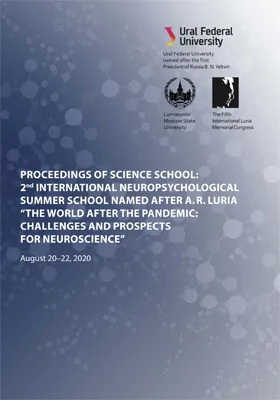
Proceedings of Science School
Здесь можно купить книгу "Proceedings of Science School" в печатном или электронном виде. Также, Вы можете прочесть аннотацию, цитаты и содержание, ознакомиться и оставить отзывы (комментарии) об этой книге.
Форматы: PDF
Издательство: Издательство Уральского университета
Год: 2020
Место издания: Екатеринбург
ISBN: 978-5-7996-3073-7
Страниц: 93
Артикул: 101184
Краткая аннотация книги "Proceedings of Science School"
The Proceedings of the Second Summer International Neuropsychological School n. a. A. R. Luria (20–22 August 2020) cover a wide range of issues related to the development of neuropsychology in the modern world. This international collection presents papers from specialists from 47 countries and includes the results of fundamental and practice-oriented research: an overview of practical technologies in the field of neuropsychological care for children with disabilities; development of the cultural-historical approach introduced by A. R. Luria and L. S. Vygotsky; studies in the field of neurolinguistics and the development of brain resources. Moreover, this volume reviews the current research on the possible negative impacts of SARS-CoV‑2 infection on the cognitive and neurological functions of recovered people.This book will be of interest to neuropsychologists, neurologists, psychologists and other specialists in the field of cognitive neurosciences.
Содержание книги "Proceedings of Science School . 2nd International Neuropsychological Summer School named after A. R. Luria “The World After the Pandemic: Challenges and Prospects for Neuroscience”, August 20–22, 2020"
Section 1. HELPING CHILDREN WITH DEVELOPMENTAL DISABILITIES
Anauate Carla. Remediation in ADHD
Glozman Janna M. Lurian neuropsychological assessment at an early age
Halpern-Chalom Marina. Identifying twice-exceptionality — a case study of a gifted child with ADHD
Lazarus Gershom T., Ginalis Christine L. Applying principles of Luria’s theory to the fetal stage and integration of psycho-physiological mechanisms to optimize adaptive behavior
Magro de Santana Braga Carolina, Versuti Fabiana Maris. Neuroscience and inclusive education: a teacher training program
Pustovaya Alina V., Pustovaya Evgenia N. Neuropsychological indicators of the level of formation of higher mental functions in children with autism spectrum disorders
Solovieva Yulia, Quintanar Luis. Qualitative neuropsychological assessment of children
Section 2. BRAIN RESOURCES IN A CHANGING WORLD
Dorogina Olga I., Khlystova Elena V., Burmistrova Julia V. Neurocognitive functions as an indicator of subjective adaptation to involutionary processes
Klimenskikh Marina V., Hajar Ayad, Kaur Harleen, Alsaykal Sura. The problem of identifying cognitive and emotional factors of academic success in an online course
Lazarus Theophilus. SARS-CoV‑2 infection and neuropsychological outcomes
Mazur Anna. The structure of the relationship between physical activity and psychosocial functioning of women and men during the COVID‑19 epidemic in Poland
Nikolaeva Elena I. Genetics and psychophysiology of ADHD and autism
Tokarskaya Liydmila V., Kolchurina Anastasia S., Lavrova Maria A., Lapteva Valeria V. Study of pregnant women’s emotional state
Section 3. NEURO-LINGUISTICS: WAYS TO FIND NEW MEANINGS
Ecer Emrullah. The emotional effects of positive and negative news through the default mode network
Kaczmarek Bożydar L. J. The embodied brain: cultural aspects of cognition
Mukhin Mikhail, Filatova Ekaterina. Sychological aspects of the style of 19th century russian authors: corpus-based analysis of literary texts in interdisciplinary research
Thomas Philippe. Narrative therapeutic approach in the care for patients with dementia and psychosis
Section 4. THE VALUE OF THE CULTURAL-HISTORICAL APPROACH IN A CHANGING WORLD
Ardila Alfredo. Luria’s aphasiology in the 21st century
Ayad Hajar, Kaur Harleen, Alsaykal Sura. The effect of diet and mindful eating on emotional intelligence: a cross-cultural study
Lazarus Theophilus. Using Luria’s neuropsychological approach to functional brain organization to understanding epilepsy
Morales González María Alejandra, Solovieva Yulia. Professional motives in primary school teachers
Sergeeva Tamara B., Batdorj Oyunjargal, Chepushtanova Irina A., Galanin Ilya S. Biographical reflection and readiness to master age-related changes at a senior age
About the authors
Все отзывы о книге Proceedings of Science School . 2nd International Neuropsychological Summer School named after A. R. Luria “The World After the Pandemic: Challenges and Prospects for Neuroscience”, August 20–22, 2020
Отрывок из книги Proceedings of Science School . 2nd International Neuropsychological Summer School named after A. R. Luria “The World After the Pandemic: Challenges and Prospects for Neuroscience”, August 20–22, 2020
20DOI 10.15826/B978-5-7996-3073-7.6Alina V. PustovayaNational Research Tomsk State University,Tomsk, RussiaEvgenia N. PustovayaNeuropsychologist of Psychological and Defectological Center ‘World of Family’Novosibirsk, RussiaNeuropsychological indicators of the level of formation of higher mental functions in children with autism spectrum disordersAbstract: This article presents the results of neuropsychological diag-nostics of a group of children with autism spectrum disorders.Keywords: autism spectrum disorders, neuropsychology, neuropsycho-logical diagnostics, higher mental functions.Introduction. The relevance of the study is associated with the increase in the registration of cases of autistic disorders among the child popu-lation. According to the World Health Organization, as of November 2019, one child out of 160 has an autistic spectrum disorder (ASD) [1]. Thus, our research focuses on neuropsychological indicators of the level of formation of higher mental functions in children with ASD.According to the 10th Revision (ICD-10) of the International Statistical Classification of Diseases and Related Health Problems, autistic disorders are general developmental disorders and represent a group of disorders characterized by qualitative deviations in social interactions and indicators of sociability as well as a limited, stereotypical, repetitive set of interests and actions [2]. The neuropsychological approach to the problem of au-tism is aimed at understanding the connection between the functioning of the brain of autistic children with mental processes, cognitive activity, behavior, and speech. Finding the level of formation of higher mental functions in children with ASD is one of the most important stages of neu-ropsychological examination. Based on the identified developmental disorders, specialists can choose the most effective rehabilitation route. © Pustovaya Alina V., Pustovaya Evgenia N., 2020
С книгой "Proceedings of Science School" читают
Внимание!
При обнаружении неточностей или ошибок в описании книги "Proceedings of Science School . 2nd International Neuropsychological Summer School named after A. R. Luria “The World After the Pandemic: Challenges and Prospects for Neuroscience”, August 20–22, 2020 (автор )", просим Вас отправить сообщение на почту help@directmedia.ru. Благодарим!
и мы свяжемся с вами в течение 15 минут
за оставленную заявку































